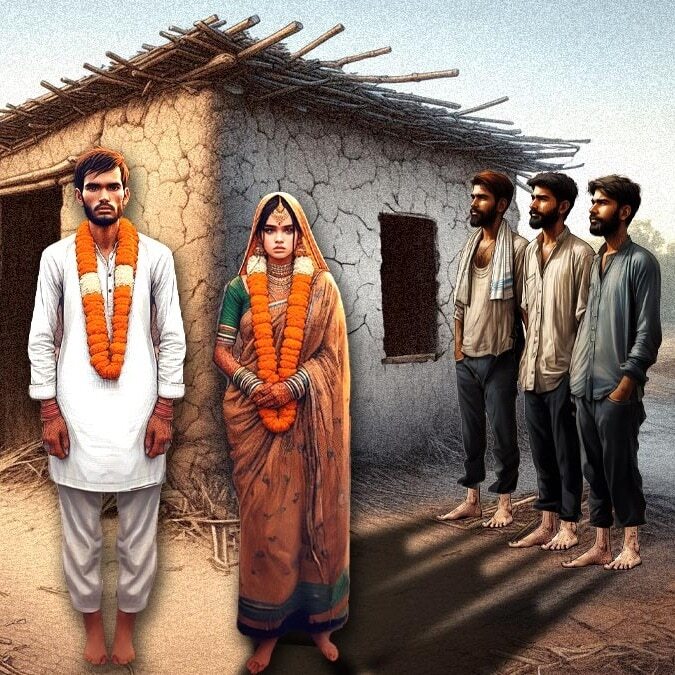In the serene hills of Himachal Pradesh, an ancient and unique marital tradition known as Draupadi Pratha continues to thrive amidst the challenges of modernity. Rooted in history and mythology, this practice sees a woman married to multiple brothers, much like the legendary Draupadi in the Indian epic Mahabharata. While this tradition has deep cultural and historical significance, it also highlights the socio-economic realities and the enduring impact of poverty in the region. This blog delves into the complexities of Draupadi Pratha, exploring its origins, current status, and the socio-economic factors that sustain it.
Origins of Draupadi Pratha
Draupadi Pratha, also known as polyandry, has its roots in ancient Indian traditions and mythology. The practice is named after Draupadi, the wife of the five Pandava brothers in the Mahabharata. Historically, polyandry was practiced in various parts of India, but it is most prevalent today in certain regions of Himachal Pradesh and Uttarakhand.
The reasons for the emergence of this practice are multifaceted:
- Resource Scarcity: In the rugged terrains of Himachal Pradesh, arable land is limited, and resources are scarce. Polyandry helped prevent the division of family land among multiple heirs, ensuring that the land remained intact and could sustain the family.
- Population Control: By limiting the number of families, polyandry served as a means of population control, reducing the strain on limited resources.
- Cultural and Mythological Influences: The reverence for characters like Draupadi in Indian mythology provided a cultural and religious framework that supported the practice.
The Practice Today
In contemporary Himachal Pradesh, Draupadi Pratha is still practiced, albeit less frequently than in the past. The tradition persists primarily in remote villages where socio-economic conditions make it a viable option.
- Marital Arrangements: Typically, the eldest brother weds the bride, but she is considered the wife of all brothers in the family. The arrangement is consensual, and all parties involved adhere to the established norms and rules of the practice.
- Household Dynamics: The household operates as a single economic unit, with all brothers contributing to the family’s welfare. Decisions are made collectively, and the children born into these families are considered the offspring of all the brothers.
Poverty and Socio-Economic Factors
The continuation of Draupadi Pratha in Himachal Pradesh is closely linked to poverty and socio-economic challenges:
- Economic Survival: In areas with limited economic opportunities, pooling resources and labor through polyandry can help families survive and maintain their livelihoods.
- Land Inheritance: By keeping land undivided, families can manage their agricultural activities more effectively, avoiding the pitfalls of land fragmentation.
- Education and Employment: Limited access to education and employment opportunities in these regions often perpetuates poverty, making traditional practices like polyandry more appealing as a means of economic stability.
The Social Impact
While Draupadi Pratha has practical benefits, it also raises complex social issues:
- Gender Roles and Rights: The practice often reinforces traditional gender roles, with women expected to navigate complex marital and familial relationships. While some women find security and stability in these arrangements, others may feel constrained by the lack of autonomy.
- Children’s Well-being: The children in polyandrous families typically receive collective care and support. However, the ambiguity regarding paternal identity can sometimes lead to social stigma and identity challenges.
- Modernization and Change: As Himachal Pradesh becomes more integrated with the broader socio-economic developments in India, traditional practices are increasingly scrutinized. Younger generations, exposed to new ideas and opportunities, are beginning to question and move away from polyandry.
Sponsored
FACTS Transcripts
Apply for a University document anywhere
https://www.factstranscript.com
Quick Transcripts for popular Universities, check your University name now and get started. We help you to get your transcript application online which is accepted for use of IRCC.
No DD, NO Paperwork. 100% Authentic, Reliable.
FACTS Transcripts Charges · Reviews · Assam Universities · Home · Know your University










